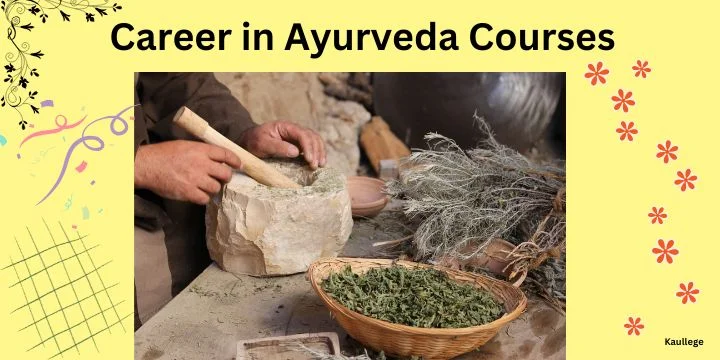Ayurveda Courses after 12 in India: India offers a multitude of treatment methods, yet many individuals remain unaware of their existence. Among these, Ayurveda Courses are gaining significant popularity and recognition at an accelerated rate. However, in contemporary society, there is a growing trust in Ayurveda as a reliable form of medicine. The foundational principles of Ayurveda are rooted in ancient medical knowledge, which has been passed down from divine beings to sages as well as human practitioners.
Meanwhile, the Ayurvedic texts detail how diseases affect individuals and the mechanisms through which medicines operate within the body. Let us explore the experience of pursuing Ayurvedic medicine courses and obtaining a degree in this field.
What is Ayurveda?
Further, ayurveda is an alternative medical system with deep historical connections to the Indian subcontinent. It is founded on the principle that health and wellness arise from a harmonious balance among the mind, body, as well as spirit. The primary objective of Ayurveda is to foster good health rather than merely combat illness, although treatments can tailor to address specific health concerns.
The therapies associated with Ayurveda have diversified and evolved over more than two thousand years. These therapies encompass herbal remedies, specialized diets, meditation, yoga, massage, laxatives, enemas, and medicinal oils. Ayurvedic formulations are generally composed of intricate herbal mixtures, minerals, and other substances.

Who is an Ayurvedic Doctor?
An Ayurvedic doctor is a medical professional who specializes in delivering healthcare and surgical support through the use of herbal remedies and tinctures, in accordance with the traditional Hindu medical system known as Ayurveda.
Likewise, ayurvedic practitioners employ a variety of methods, including herbal medicines, dietary recommendations, touch, color therapy, aromatherapy, and sound therapy, to promote healing in their patients. Ayurveda is actively integrated into various medical subspecialties, including internal medicine, surgery, psychiatry, ENT, gynecology, sexual health, toxicology, obstetrics, as well as pediatrics, among others.
Quick Facts
The following provides a brief overview of the Ayurveda course, such as:
| Particulars | Description |
| Course Name | Bachelor of Ayurvedic Medicine B. Pharm (Ayurveda) BSc Nursing (Ayurveda) MS/MD in Ayurveda PhD in Ayurveda |
| Course Duration | UG: 5.5 years PG: 3 years PhD: 3-5 years |
| Eligibility | UG: 10+2 with 50% marks in PCB PG: BAMS Degree |
| Average Fees | INR 22.37K |
| Career Opportunities | Medical Representation, Product Manager, Pharmacist, Resident Medical Officer |
| Recruiting Sectors | Education industry, medical industry, Tourism industry, Pharmaceutical Industry |
| Recruiting Companies | Patanjali Ayurved Limited Dabur The Himalaya Drug Company Zandu Pharmaceuticals Works Limited Surya Herbal Limited |
Ayurveda Courses Available in India
The following outlines the Ayurveda courses in India along with their respective durations, such as:
| Course Name | Duration |
| Bachelor of Ayurvedic Medicine and Surgery (BAMS) | 5.5 years |
| B.Pharm (Ayurveda) | 4 years |
| B.Sc Nursing (Ayurveda) | 4 years |
| MS/MD in Ayurveda) | 3 years |
| PhD in Ayurveda | 3-5 years |
Admission Process for Ayurveda Courses
- Candidates aspiring to enroll in an Ayurveda course must have completed their 10+2 education with a minimum aggregate of 50% in the science stream (Physics, Chemistry, Biology).
- A NEET scorecard is required for admission to undergraduate programs. After successfully passing the NEET examination, candidates must engage in the Ayush NEET Counselling, which conducted by the AACCC or the state counseling authority (Ayush department of the respective state).
- At last, for postgraduate programs, candidates must possess an AIAPGET scorecard.
Eligibility Requirements
When seeking admission to any course, candidates must adhere to specific eligibility criteria. The Ayurveda course has its own set of requirements.
Eligibility Criteria for Undergraduate Programs
The eligibility criteria for undergraduate programs in Ayurveda must met by candidates seeking admission, such as:
| Particulars | Description |
| Age limit | The minimum age limit is 17 years |
| Qualification | 10+2 with a minimum of 50% aggregate marks in the science stream |
| Qualifying Entrance Exam | NEET |
Eligibility Criteria for Postgraduate Programs
The eligibility criteria for postgraduate programs in Ayurveda must also fulfilled by candidates, such as:
| Particulars | Description |
| Qualification | BAMS degree |
| Qualifying Entrance Exam | AIAPGET |
Prominent Institutions Offering Ayurveda Courses
The following institutions are recognized for their Ayurveda courses, such as:
| College Name | Location | Average Fees |
| Faculty of Ayurveda BHU | Varanasi | INR 22.37K |
| Dr DY Patil College of Ayurved and Research Institute & Hospital | Pune | INR 4.50L |
| Madhave Ayurveda Medical College | Rajasthan | INR 60K |
| Parul Institute of Ayurved Vadodara | Vadodara | INR 3.75L |
| Rajiv Gandhi Ayurveda Medical College and Hospital Mahe | Manipal | INR 45K |
State-wise Ayurveda Colleges in India
Below is a compilation of state-wise colleges offering BAMS courses, such as:
| State | State |
| Andhra Pradesh | Nagaland |
| Arunachal Pradesh | Odisha |
| Assam | Punjab |
| Bihar | Rajasthan |
| Chhattisgarh | Sikkim |
| Goa | Tamil Nadu |
| Gujarat | Tripura |
| Haryana | Telangana |
| Himachal Pradesh | Uttar Pradesh |
| Jharkhand | Uttarakhand |
| Jammu and Kashmir | West Bengal |
| Karnataka | Andaman and Nicobar |
| Kerala | Chandigarh |
| Madhya Pradesh | Delhi |
| Maharashtra | Daman and Diu |
| Manipur | Dadar and Nagar Haveli |
| Meghalaya | Lakshadweep |
| Mizoram | Puducherry |
Career Prospects in Ayurveda
The demand for Ayurvedic practitioners is currently significant, leading to extensive career opportunities. A key distinguishing feature of Ayurveda compared to other medical disciplines is the minimal side effects associated with its treatments. This has contributed to a substantial increase in the demand for Ayurvedic doctors both in India and internationally.
Graduates in Ayurvedic medicine can secure lucrative employment opportunities. Furthermore, Ayurveda has recently expanded into surgical domains, resulting in an increase in job openings within the field. There is a notable demand for BAMS doctors abroad.
Job Profile
The subsequent outlines pertain to the job profiles associated with Ayurveda courses, such as:
| Sales representatives | Therapist |
| Scientist | Sales Executive |
| Medical Representative | Product Manager |
| Pharmacist | Resident Medical Officer |
| Business development officer | Category Manager |
| Ayurvedic Doctor | Lecturer |

Roles of an Ayurvedic Doctor
The responsibilities of an Ayurvedic doctor include:
• Consulting with patients during visits
• Obtaining informed consent from patients
• Ensuring the avoidance of negligence and experimental practices
• Providing comprehensive guidance to patients
• Maintaining accurate health records for patients
Skills Required for an Ayurvedic Doctor
The essential skills for an Ayurvedic doctor encompass:
• Exceptional management capabilities
• Strong counseling abilities
• Effective communication skills
• Proficient decision-making skills
• Research proficiency

Life of an Ayurvedic Doctor
Upon graduation, students often pursue further education, such as postgraduate studies or research, to enhance their expertise. Numerous job opportunities exist for Ayurvedic doctors in both government and private sectors. Some well-trained practitioners may establish their own clinics focused on research and treatment. Depending on individual skills and interests, career paths may differ; for instance, some may opt to teach at Ayurveda colleges after completing postgraduate studies. A degree in Ayurveda permits legal practice throughout India.
Average Salary
Candidates typically pursue an MD or MS in Ayurveda, with many opting for the BAMS undergraduate program after passing the NEET entrance examination. Graduates can further specialize by enrolling in diploma programs lasting 1-2 years.
Degree-wise
The following outlines the average salary based on degree attainment, such as:
| Degree | Average Salary (INR) |
| Diploma Degree | INR 2-6 Lakh per annum |
| Undergraduate Degre | INR 2-15 Lakh per annum |
| Postgraduate Degree | INR 4-20 Lakh per annum |
Experience-wise
As practitioners gain experience in the field of Ayurveda, their salaries tend to increase. The following details the average salary based on experience, such as:
| Years of Experience | Average Salary (INR) |
| 0-5 years | INR 3.3-3.7 Lakh per annum |
| 5-10 years | INR 4.3-12.8 Lakh per annum |
| 10-15 years | INR 4.5-13.4 Lakh per annum |
| 20 years and above | INR 5.1-16.4 Lakh per annum |
Recruiting Sectors
The following sectors actively recruit for Ayurveda courses, such as:
| Educational Industry | Medical Tourism Industry |
| Pharmaceutical Industry | Healthcare Industry |
| Insurance Industry | Nursing |
| Life Science Industry | Research Centre |
Recruiting Companies
The following companies are known to recruit graduates from Ayurveda courses, such as:
| Patanjali Ayurved Limited | Dabur |
| The Himalaya Drug Company | Zandu Pharmaceuticals Works Limited |
| Surya Herbal Limited | Vicco Laboratories |
| Charak Pharma Private Limited | Emami Limited |


Leave a Reply